
International Journal of Indigenous Health
Scope & Guideline
Elevating Voices: Indigenous Health at the Forefront
Introduction
Aims and Scopes
- Culturally Relevant Health Research:
The journal prioritizes research that is grounded in Indigenous knowledge systems and cultural practices, ensuring that the health issues faced by Indigenous communities are addressed in a culturally sensitive manner. - Community Engagement and Empowerment:
A key focus is on community-driven health initiatives, empowering Indigenous communities to take the lead in identifying their health priorities and solutions. - Interdisciplinary Approaches to Indigenous Health:
The journal encourages interdisciplinary research that incorporates insights from health sciences, social sciences, and Indigenous studies to create holistic understandings of health. - Focus on Social Determinants of Health:
Research published in the journal often explores the social determinants affecting Indigenous health, including housing, education, and systemic racism, emphasizing the need for comprehensive health strategies. - Strengths-Based Perspectives:
The journal promotes a strengths-based approach, highlighting resilience, well-being, and positive health outcomes within Indigenous populations rather than solely focusing on deficits. - Policy and Advocacy:
The journal serves as a platform for discussions on health policy and advocacy for Indigenous rights, addressing systemic barriers to health care access and equity.
Trending and Emerging
- Mental Health and Well-Being:
There is an increasing focus on mental health issues within Indigenous communities, particularly regarding the impact of cultural identity and community support, reflecting a growing recognition of mental health as a critical component of overall well-being. - Racism and Health Care Equity:
Recent studies address systemic racism in health care and its impact on Indigenous populations, indicating a trend towards advocating for health equity and anti-racist practices within health systems. - Culturally Safe Care Practices:
The concept of culturally safe care is becoming more prominent, with an emphasis on training health care providers to deliver care that respects and integrates Indigenous cultural values. - Impact of COVID-19 on Indigenous Communities:
The journal has seen a surge in publications related to the impact of the COVID-19 pandemic on Indigenous health, highlighting community resilience and the need for tailored public health responses. - Land-Based Healing and Connection to Place:
An emerging theme is the exploration of land-based healing practices and their significance in promoting health and wellness among Indigenous peoples, reinforcing the connection between land, culture, and health. - Youth Engagement in Health Initiatives:
There is a growing trend towards engaging Indigenous youth in health research and initiatives, recognizing their vital role in shaping the future of Indigenous health.
Declining or Waning
- Traditional Healing Practices:
There appears to be a waning focus on traditional healing practices, which were once prominent in discussions around Indigenous health. This may be due to increasing integration of Western medical practices overshadowing traditional methods. - Generalized Studies on Indigenous Health Without Context:
There is a noticeable decrease in generalized studies that do not incorporate specific cultural contexts or community engagement. Recent publications emphasize the importance of localized and culturally relevant research. - Broad Public Health Campaigns:
The journal has shifted away from broader public health campaigns that lack specific Indigenous perspectives, focusing instead on targeted community-based initiatives.
Similar Journals
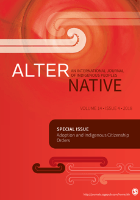
Alternative-An International Journal of Indigenous Peoples
Connecting Scholars to the Heart of Indigenous StudiesAlternative: An International Journal of Indigenous Peoples is a leading academic journal published by SAGE Publications Ltd that focuses on the complexities, narratives, and contemporary issues surrounding Indigenous communities globally. With an impressive Q1 ranking in Anthropology, Cultural Studies, and History, this journal stands at the forefront of interdisciplinary research, making significant contributions to understanding Indigenous peoples’ rights, cultural heritage, and social justice. Spanning years from 2014 to 2024, it serves as a vital platform for researchers, professionals, and students engaged in discussions and studies related to Indigenous knowledge systems and cultural dynamics. The journal operates under rigorous peer-review standards, ensuring high-quality scholarly articles that resonate within the academic community. Although it currently does not offer open access, the valuable insights and research findings presented within its pages are indispensable for anyone dedicated to advancing the field of Indigenous studies.

AUSTRALIAN JOURNAL OF SOCIAL ISSUES
Understanding Socio-Political ConstructsAustralian Journal of Social Issues, published by Wiley, is a prestigious academic journal that has been at the forefront of social science research since its inception in 1975. With a focus on sociology and political science, this journal ranks impressively in the 2023 Scopus rankings, positioned at #297 out of 1466 journals, reflecting its significant impact within the field (79th percentile). The journal lacks an open access model, affirming its traditional scholarly avenues while still attracting a wide readership interested in social issues pertinent to Australia and beyond. Covering a diverse range of topics regarding socio-political dynamics, institutional analysis, and community studies, it provides invaluable insights for researchers, professionals, and students keen to explore contemporary social challenges. With a history that converges into the current year, the Australian Journal of Social Issues continues to contribute meaningfully to the scholarly discourse, enhancing our understanding of social constructs and their implications across the globe.
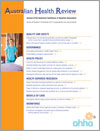
Australian Health Review
Pioneering Research for a Healthier AustraliaAustralian Health Review is a prestigious peer-reviewed journal published by CSIRO PUBLISHING, focusing on the dynamic field of health policy. Established in 1980, this journal has continuously evolved to address contemporary health challenges in Australia and beyond, showcasing research that informs policy decisions and enhances health care delivery. With an impressive Q2 ranking in the sector of Health Policy and a Scopus rank of #162 out of 310, it holds a significant position in the academic community, offering vital insights to researchers, practitioners, and educators alike. Although not an open-access journal, it provides valuable research contributions that advance the discourse in health policy and practice. Located at UNIPARK, BUILDING 1, LEVEL 1, 195 WELLINGTON RD, LOCKED BAG 10, CLAYTON, VIC 3168, AUSTRALIA, the journal's comprehensive scope spans from 1980 to 2024, reflecting on the evolving landscape of health research. By disseminating high-quality studies, the Australian Health Review continues to play an essential role in shaping health policy and improving health outcomes.
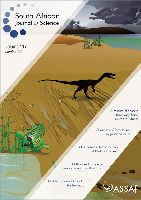
SOUTH AFRICAN JOURNAL OF SCIENCE
Exploring the Depths of Scientific InquiryThe SOUTH AFRICAN JOURNAL OF SCIENCE, published by the Academy of Science of South Africa (ASSAf), is a prestigious open-access journal dedicated to the advancement and dissemination of scientific knowledge across various disciplines. Since its inception in 1973, the journal has played a pivotal role in fostering scientific communication within South Africa and beyond, ranking in the Q2 and Q3 quartiles across critical categories such as Agricultural and Biological Sciences, Biochemistry, Genetics and Molecular Biology, and Earth and Planetary Sciences as of 2023. With an ISSN of 0038-2353 and E-ISSN 1996-7489, this journal embraces modern publishing practices, having adopted an open-access model in 2009, which ensures that research is readily accessible to a global audience. The journal aims to promote interdisciplinary research and facilitate collaboration among scientists, making it an essential resource for researchers, professionals, and students eager to contribute to and learn from the dynamic landscape of scientific inquiry. For further information, collaborators and correspondents may reach out to the journal through its contact address: PO BOX 72135, LYNWOOD RIDGE 0040, SOUTH AFRICA.
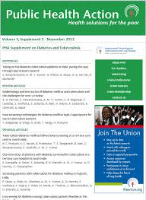
Public Health Action
Championing the fight against communicable diseases.Public Health Action, published by the International Union Against Tuberculosis and Lung Disease (IUATLD), is a pivotal open-access journal dedicated to advancing knowledge and practice in the fields of public health and health policy. Since its inception in 2011, the journal has provided a platform for innovative research and impactful discussions that shape the future of public health, with an emphasis on combating tuberculosis and other communicable diseases. With an ISSN of 2220-8372 and a presence in Scopus, the journal is ranked #110 in Health Policy and #249 in Public Health, Environmental and Occupational Health, showcasing its commitment to quality and relevance in its field. Housed in Paris, France, Public Health Action invites researchers, professionals, and students to explore cutting-edge research that informs policy and practice and contributes to the global fight against diseases. By offering open access to its content, the journal ensures that vital information remains accessible to a diverse audience, fostering collaboration and innovation worldwide.
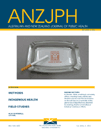
AUSTRALIAN AND NEW ZEALAND JOURNAL OF PUBLIC HEALTH
Illuminating Pathways to Better Health OutcomesAustralian and New Zealand Journal of Public Health (ISSN: 1326-0200, E-ISSN: 1753-6405), published by Elsevier Science Inc, stands as a leading platform in the field of public health, with a notable impact factor and recognition in the 2023 category quartiles as Q1 in Public Health, Environmental and Occupational Health. This esteemed journal, operating as an Open Access resource since 2017, facilitates immediate access to high-quality research findings and insights, making it an invaluable asset for researchers, professionals, and students dedicated to advancing knowledge in these critical areas. Hailing from the Netherlands, the journal embraces a wide scope, encompassing interdisciplinary studies that address pressing public health issues across Australia and New Zealand and beyond, reflecting evolving challenges and innovations in the sector. With a robust ranking in Scopus, it is poised to continue influencing policy and practice while fostering rigorous academic discourse for years to come.
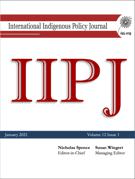
International Indigenous Policy Journal
Fostering Dialogue on Global Indigenous IssuesInternational Indigenous Policy Journal, published by University of Western Ontario, serves as a pivotal platform in the fields of Anthropology, Cultural Studies, and Sociology and Political Science. Since its inception in 2010, this Open Access journal has championed the dissemination of scholarly works that advance the understanding and implementation of indigenous policies globally. Operating from the esteemed academic setting of London, Ontario, Canada, it has solidified its reputation, as evidenced by its impressive category quartile rankings, notably achieving Q1 status in Cultural Studies and Q2 rankings in both Anthropology and Sociology/Political Science in 2023. Researchers, professionals, and students can find exceptional insights within its pages, as it ranks in the top percentiles for its respective fields, reflecting its crucial role in influencing contemporary dialogues surrounding indigenous issues. With a commitment to inclusive scholarship, International Indigenous Policy Journal continues to be an essential resource for those dedicated to understanding and supporting indigenous communities and their policy contexts.

Journal of Immigrant and Minority Health
Fostering Dialogue on Social Determinants of HealthJournal of Immigrant and Minority Health, published by SPRINGER, stands as a pivotal platform for research concentrated on the health challenges faced by immigrant and minority populations in the United States and globally. With an ISSN of 1557-1912 and E-ISSN of 1557-1920, the journal spans the years from 2006 to 2024, and currently resides in the impressive Q1 category in Public Health and Q2 in Epidemiology for 2023. Recognized for its impactful contributions, it ranks in the 59th percentile among 665 journals in the domain of Public Health and 48th percentile among 148 in Epidemiology, according to Scopus rankings. The journal aims to illuminate the intricate interplay between social determinants, healthcare access, and health outcomes for minority groups, fostering important discourse and innovative solutions within the field. Although subscription-based, it remains an essential resource for researchers, practitioners, and students who seek to broaden their understanding and influence policies that affect vulnerable populations.
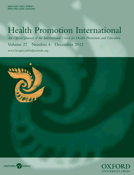
HEALTH PROMOTION INTERNATIONAL
Advancing global health through innovative research.HEALTH PROMOTION INTERNATIONAL, published by Oxford University Press, stands as a pioneering journal within the domain of public health and social sciences, contributing significantly to the advancement of health promotion research since its inception in 1986. Renowned for its rigorous peer-review process, this esteemed journal boasts an impressive Q1 ranking in Health (Social Science) and a Q2 category status in Public Health, Environmental, and Occupational Health as of 2023, underscoring its vital role in shaping health policy and practice. With a current Scopus rank of #81 out of 371 in Health Sciences and #202 out of 665 in the realm of Public Health, it features research that addresses critical health issues and promotes innovative strategies for enhancing community wellbeing. Though it operates on a traditional access model, the journal remains committed to disseminating high-quality research that opens vital conversations among researchers, practitioners, and policymakers alike. With a convergence of knowledge extending to 2024, HEALTH PROMOTION INTERNATIONAL continues to be an essential resource for those dedicated to improving health outcomes across populations.

Global Health-Science and Practice
Connecting Knowledge to Practice in Global Health.Global Health-Science and Practice, published by the prestigious Johns Hopkins Center for Communication Programs, is a vital open-access journal dedicated to advancing the fields of global health and health policy. With an ISSN of 2169-575X and a remarkable track record since its inception in 2013, this journal serves as a platform for innovative research and policy analysis, empowering a diverse audience including researchers, practitioners, and students. Currently ranked in the Q2 category in Health Policy and Public Health, and Q1 in Medicine (miscellaneous) as of 2023, it boasts Scopus rankings that highlight its influence and reach within the global health community. Located in Baltimore, MD, this journal not only facilitates the sharing of critical insights but also promotes evidence-based practices that can shape policy and improve health outcomes worldwide. With its commitment to accessibility and quality, Global Health-Science and Practice remains an essential resource for those dedicated to addressing global health challenges.